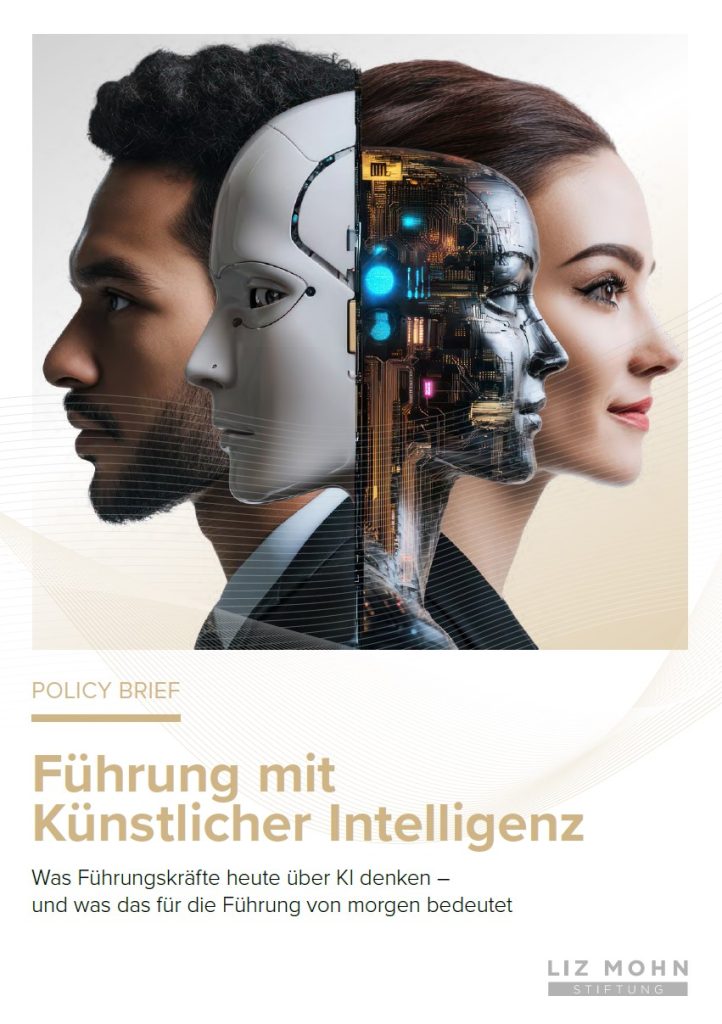Many companies and organizations in Germany are still far from being fully prepared to deal with AI (AI readiness), and many executives remain cautious about using artificial intelligence. This is shown by a recent survey conducted by the Liz Mohn Foundation among 1,000 executives from business, politics, and culture in Germany.
Only about one-third of respondents currently use AI regularly for standardized management tasks such as communication or planning. Artificial intelligence is used even less for more complex tasks such as conflict resolution or personnel decisions (23 and 19 percent, respectively). Various factors influence this: Although around 60 percent of respondents see opportunities for developing a learning organizational culture, just as many fear that AI will lead to a culture of surveillance and control and, not least, to a weakening of human components in leadership. It also shows that, depending on the complexity of the management task, up to 47 percent of managers can imagine using it more extensively. Younger managers are more open to this: 51 percent of them already use AI for relevant management tasks.
Key findings of the study
The study “Leadership with Artificial Intelligence” systematically examines how managers use AI for leadership tasks today, in which areas they can imagine using it in the future, what opportunities and risks they see, and how the leadership role is changing in the digital transformation. The results of the study show:
- AI-Readiness: 41 percent of executives already confirm widespread acceptance of AI in their organizations. In contrast, 28 percent do not see widespread acceptance of AI, and 27 percent do not see active promotion and implementation of AI initiatives. Furthermore, AI is not used in their organizations for data-driven decisions (27 percent) or perceived as a competitive advantage (30 percent).
- Use in management tasks: Around one-third of respondents use AI regularly—primarily for standardizable management tasks such as communication (37 percent) and planning (33 percent). AI is rarely used for more complex management tasks such as conflict resolution (23 percent) or personnel decisions (19 percent).
- Future use – skepticism vs. openness: The picture is mixed when it comes to the future use of AI in management tasks. Although a certain degree of reluctance prevails here too, almost half of managers can imagine using it for management tasks – for example, 47 percent for planning and 45 percent for communication. Skepticism remains greater when it comes to complex management tasks such as personnel development (30 percent), conflict resolution (27 percent), and personnel decisions (23 percent). At the same time, a good third believe it is possible that AI could completely take over certain management tasks in the future, such as planning (40 percent), communication (36 percent), and control (34 percent). Accordingly, more managers see AI as a supplement to their work rather than a replacement.
- Concerns slow down implementation: Around 60 percent of the executives surveyed see opportunities for AI to promote a learning organizational culture and support a willingness to innovate in leadership culture. Just as many fear that AI could lead to a culture of surveillance and control, as well as a dependence on technology, which could reduce the importance of emotional intelligence and weaken human components in leadership culture.
- Generational differences: Younger managers are significantly more open to AI. For example, 51 percent of managers aged 24 to 34 who were surveyed already use AI for certain management tasks.
- Span of control: There is a clear correlation between span of control and frequency of AI use in one’s own management tasks: the more employees are managed (1-4 employees: between 9 percent and 22 percent compared to 50-100 employees: between 42 percent and 56 percent), the more frequently AI is used. Even where AI is strategically anchored, it is used significantly more often.
Recommendations for action: Rethinking leadership
The study formulates precise recommendations for executives, organizations, and society. Executives should critically examine their responsibilities and consider which tasks can be supported or taken over by AI in the future and where their own strengths and responsibilities lie.
Organizations should take fears seriously, communicate opportunities and limitations openly, and strategically integrate AI as a strategic element. This includes creating framework conditions that promote trust and enable constructive use.
Society needs to intensify the dialogue on responsibility, the relationship between employers and employees, and the protection of democratic values in the age of AI. AI is fundamentally changing the world of work—this requires common guidelines that offer security and orientation and strengthen social cohesion.
About the study
The online survey was conducted in January 2025. It polled 1,000 leaders from business, politics, and culture in Germany between the ages of 24 and 74. The opinion research institute Ipsos conducted the survey on behalf of the Liz Mohn Foundation.



